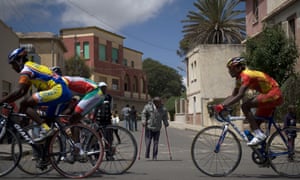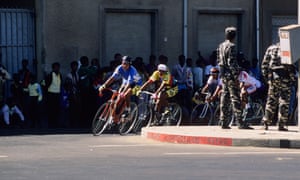Eritrea and neighbouring Ethiopia are at the forefront of women’s cycling in Africa. Jock Boyer, an American-born coach and former Tour de France rider who promotes cycling on the continent, said: “There’s no women’s cycling in Africa unless you go to South Africa and even then it’s fine but it’s not great. It’s hard to get races. The talent, especially in Ethiopia, is phenomenal. That’s where you see the most potential – more than here. They’re built for cycling.”
Italian colonialists introduced the first bikes to Eritrea in 1898 and cycling remains a way of life. Earlier this year, Daniel Teklehaimanot and Merhawi Kudus became the first black Africans to compete in the Tour de France. The streets of Asmara teem with bikes of varying vintage as well as an extraordinary number of cycle repair shops; a new model is way beyond the means of most citizens.
Boyer added: “There are bikes still working at 50 to 60 years old. We saw one bike that’s a 100 years old with a stack of licence plates. It’s a whole mentality: we’re going to preserve something for a long time because we can’t afford to replace it.”
Eritrean cycling received a further boost last month when Qhubeka distributed 220 Chinese-made bikes to children – split evenly among boys and girls – to help ease their daily commute to school. Among the recipients at a ceremony attended by government and UN officials, and clapping, ululating mothers, was Alem Bereket, 16, who gets up at 5.30am each day for a three-hour walk to school five miles away.
“I am tired when I get there and it affects my work,” said Bereket, whose favourite subjects are English and chemistry. “It is hard for me, especially if it rains and damages my exercise books, but I have no choice. I am happy to receive a bike as it will now take me half an hour to go to school.”
Bereket added that she had experience of riding and would like to turn professional one day. “I want to be in the Tour de France.”

